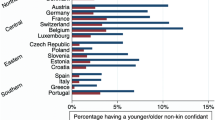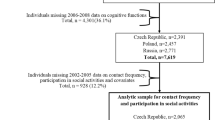Summary
The impact of social relationships on the maintenance of independence over periods of 12–18 months in a group of 306 octogenarians is assessed in this study. The study is based on the results of the Swilsoo (Swiss Interdisciplinary Longitudinal Study on the Oldest Old). Participants (80–84 years old at baseline) were interviewed five times between 1994 and 1999. Independence was defined as the capacity to perform without assistance eight activities of daily living. We distinguished in our analyses kinship and friendship networks and evaluated social relationships with the help of a series of variables serving as indicators of network composition and contact frequency. Logistic regression models were used to identify the short-term effects of social relationships on independence, after controlling for sociodemographic and health-related variables; independence at a given wave of interviews was interpreted in the light of social factors measured at the previous wave. Our analyses indicate that the existence of a close friend has a significant impact on the maintenance of independence (OR=1.58, p<0.05), which is not the case with the other variables concerning network composition. Kinship contacts were also observed to have a positive impact on independence (OR=1.12, p<0.01).
Zusammenfassung
Diese Studie untersucht für eine Population im hohen Greisenalter den Einfluss des Beziehungslebens auf die Erhaltung der Unabhängigkeit über einen Zeitraum von 12 oder 18 Monaten, wobei sie zwischen familiären und freundschaftlichen Netzen unterscheidet. Sie basiert auf die ersten fünf Gesprächswellen (1994 bis 1999) der Swilsoo (Swiss Interdisciplinary Longitudinal Study on the Oldest Old). 360 Personen—zu Beginn im Alter von 80 bis 84 Jahren—wurden für die Analysen ausgewählt. Die Unabhängigkeit wurde definiert als die Fähigkeit, acht Tätigkeiten des täglichen Lebens ohne Hilfe auszuführen. Was das Beziehungsleben anbetrifft, so verfügte man über eine Reihe von Variablen hinsichtlich der Zusammensetzung der Netze und der Frequenz der Kontakte. Logistische Regressionsmodelle wurden durchgeführt, wobei die Unabhängigkeit in einer gegebenen Welle durch die in der vorangegangenen Welle gemessenen sozialen Faktoren unter Kontrolle der soziodemographischen und gesundheitsbezogenen Variablen erklärt wird. Das Vorhandensein einer Freundesperson trägt in signifikanter Weise zur Aufrechterhaltung der Unabhängigkeit bei (OR=1,58, p<0,05), was bei den sonstigen, die Zusammensetzung der Netze betreffenden Variablen nicht der Fall war. Man konstatiert ebenfalls einen positiven Einfluss familiärer Kontakte auf die funktionelle Gesundheit (OR=1,12, p<0,01).
Similar content being viewed by others
References
Bowling A, Browne PD (1991) Social networks, health, and emotional wellbeing among the oldest old in London. J Gerontol B psychol Sci Soc Sci 46:20–32
Carstensen LL (1991) Socioemotional selectivity theory: social activity in life-span context. Annual Review of Gerontology and Geriatrics 11:195–217
Crohan SE, Antonucci TC (1989) Friends as a source of social support in old age. In: Adams RG, Blieszner R (eds) Older adult friendship. Structure and Process. Sage, Newbury Park, pp 129–46
Femia EE, Zarit SH, Johansson B (1997) Predicting change in activities of daily living: a longitudinal study of the oldest old in Sweden. J Gerontol B Psychol Sci Soc Sci 52:294–302
Guilley E, Pin S, Lalive d’Epinay C (2002) Vie relationnelle et longévité dans la grande vieillesse; un suivi de 5 ans d’une cohorte d’octogénaires (Social networks and survival in very old age; a study of a cohort of octogenarians over a five-year period). L’Année Gérontologique 16:23–34
House JS, Landis KR, Umberson D (1988) Social relationships and health. Science 241:540–545
Johnson CL, Barer BM (1996) Life Beyond 85 Years. The Aura of Survivorship. Springer, New-York
Katz S, Ford AB, Moskowitz RW, Jackson BA, Jaffee MW (1963) Studies of illness in the aged. The index of ADL: a standardized measure of biological and psychosocial function. JAMA 185:94–101
Krause N, Borawski-Clark (1994) Clarifying the functions of social support in later life. Research on Aging 16:251–279
Lalive d’Epinay C, Cavalli S, Spini D (2003) The death of a loved one: impact on health and relationships in very old age. OMEGA 47:265–284
Mendes de Leon CF, Glass TA, Beckett LA, Seeman TE, Evans DA, Berkman LF (1999) Social networks and disability transitions across eight intervals of yearly data in the New Haven EPESE. J Gerontol B psychol Sci Soc Sci 54:162–172
Oxman TE, Hull JG (1997) Social support, depression and activities of daily living in older heart surgery patients. J Gerontol B Psychol Sci Soc Sci 52:1–14
Pin S, Guilley E, Lalive d’Epinay C, Vascotto Karkin B (2001) La dynamique de la vie familiale et amicale durant la grande vieillesse (Dynamics in social networks in advanced old age). Gérontologie et Société 98:85–101
Rogers RG (1996) The effects of family composition, health and social support linkages on mortality. J Health Soc Behav 37:326–338
Rosow I, Breslau N (1966) A Guttman health scale for the aged. J Gerontol 21:556–559
Ross CE, Mirowsky J, Goldsteen K (1990) The impact of the family on health: the decade in review. Journal of Marriage and the Family 52:1059–1978
Seeman TE, Bruce ML, McAvay GJ (1996) Social network characteristics and onset of ADL disability: MacArthur studies of successful aging. J Gerontol B psychol Sci Soc Sci 51:191–200
Siegrist J (2000) The social causation of health and illness. In: Albrecht GL, Fitzpatrick R, Scrimshaw SC (eds) The handbook of social studies in health and medicine. Sage, London, pp 100–114
SPSS Inc. (1990) SPSS Reference Guide. SPSS International, Chicago
Stuck AE, Walthert JM, Nikolaus T, Büla CJ, Hohmann C, Beck JC (1999) Risk factors for functional status decline in community-living elderly people: a systematic literature review. Soc Sci Med 48:445–469
Uchino BN, Cacioppo JT, Kiecolt-Glaser JK (1996) The relationship between social support and physiological processes: a review with emphasis on underlying mechanisms and implications for health. Psychol Bull 119:488–531
Unger JB, McAvay GJ, Bruce ML, Berkman LF, Seeman TE (1999) Variation in the impact of social network characteristics on physical functioning in elderly persons: MacArthur studies of successful aging. J Gerontol B psychol Sci Soc Sci 54:245–251
Wang RIH, Treul S, Alverno L (1975) A Brief Self-Assessing Depression Scale. J Clin Pharmacol, pp 163–167
WHO (1980) Classification of impairments, disabilities and handicaps. World Health Organization, Geneva
Author information
Authors and Affiliations
Corresponding author
Rights and permissions
About this article
Cite this article
Pin, S., Guilley, E., Spini, D. et al. The impact of social relationships on the maintenance of independence in advanced old age: findings of a Swiss longitudinal study. Z Gerontol Geriatr 38, 203–209 (2005). https://doi.org/10.1007/s00391-005-0250-9
Received:
Accepted:
Issue Date:
DOI: https://doi.org/10.1007/s00391-005-0250-9




